Medicine and Health: Reflective Practice on Palliative Care
VerifiedAdded on 2020/03/04
|10
|2722
|52
Report
AI Summary
This report delves into the complexities of palliative care for mentally ill patients, focusing on healthcare disparities and barriers encountered within the clinical setting of Royal Brisbane and Women’s Hospital (RBWH). The student's reflective practice examines the challenges faced by this vulnerable population, including limited awareness, stigma, and lack of specialized resources. The report highlights the importance of improving access to palliative care, enhancing outpatient services, and providing comprehensive training to healthcare professionals. Based on observations and informal surveys, the student proposes strategic interventions, such as strengthening multidisciplinary collaboration and addressing the unique needs of patients with both mental and physical illnesses. The report emphasizes the need for a more empathetic and evidence-based approach to patient care, aiming to reduce healthcare barriers and improve the quality of life for mentally ill patients in palliative care. The report concludes with recommendations for future interventions, including better access, training, and improved outpatient services to address the challenges of providing quality care to those facing mental health issues alongside terminal illnesses.
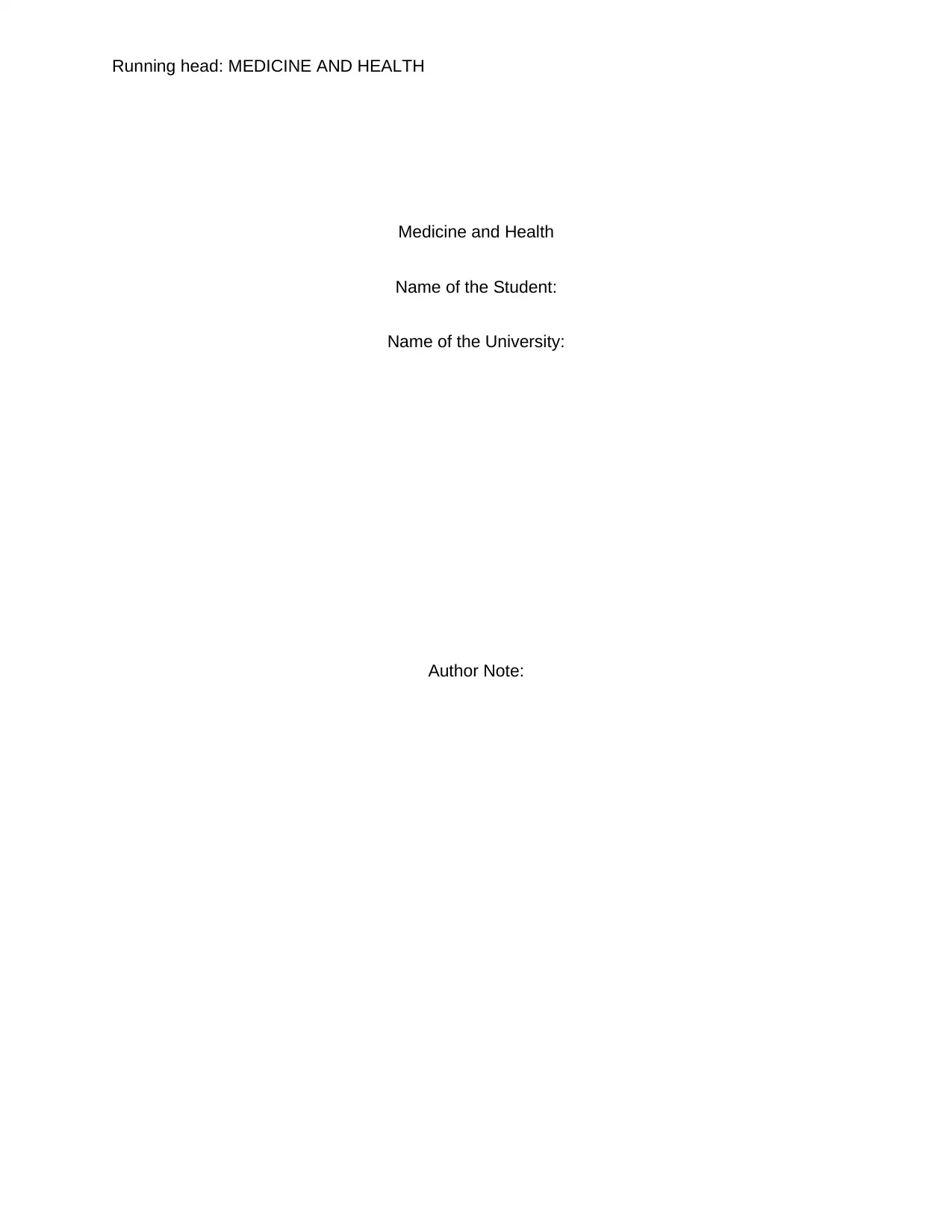
Running head: MEDICINE AND HEALTH
Medicine and Health
Name of the Student:
Name of the University:
Author Note:
Medicine and Health
Name of the Student:
Name of the University:
Author Note:
Paraphrase This Document
Need a fresh take? Get an instant paraphrase of this document with our AI Paraphraser
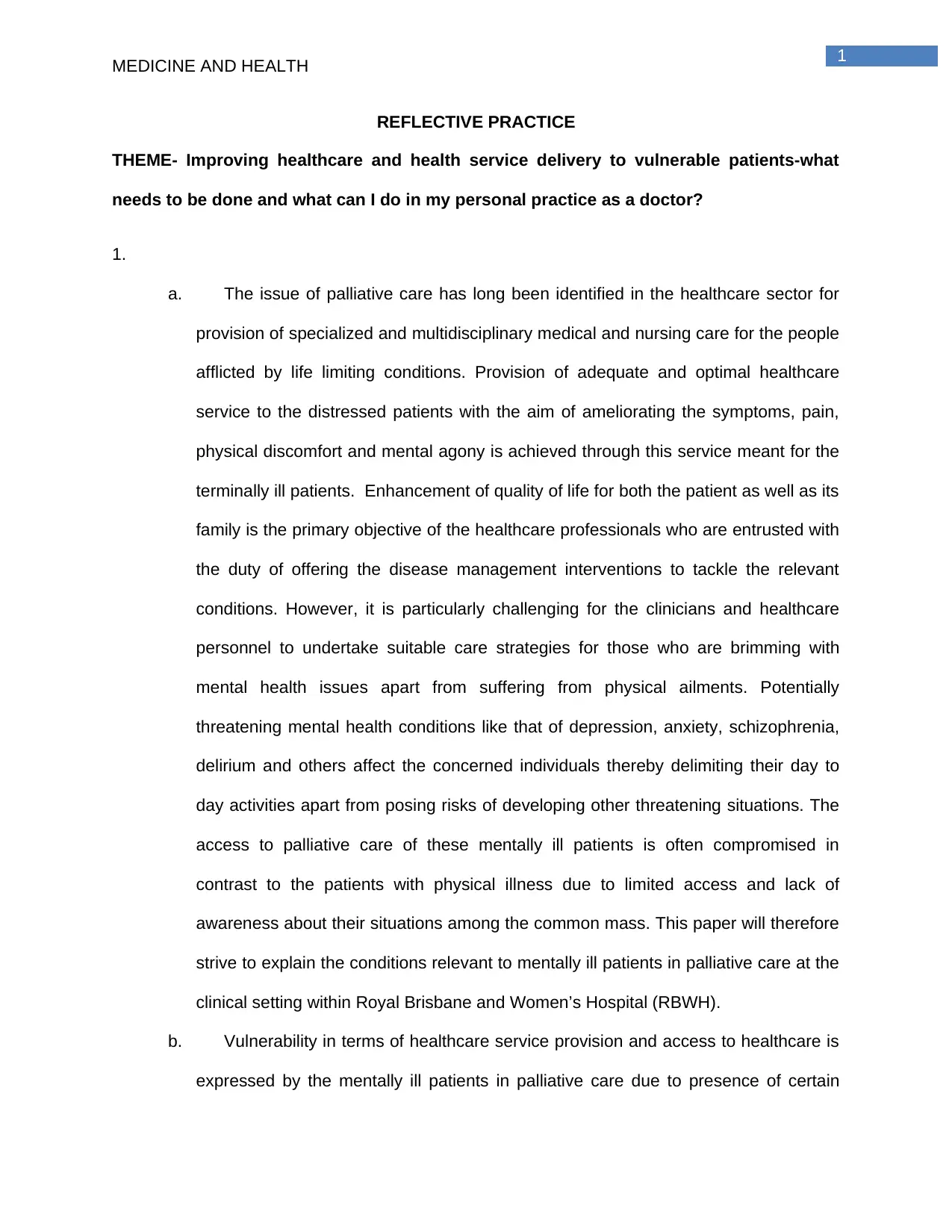
1
MEDICINE AND HEALTH
REFLECTIVE PRACTICE
THEME- Improving healthcare and health service delivery to vulnerable patients-what
needs to be done and what can I do in my personal practice as a doctor?
1.
a. The issue of palliative care has long been identified in the healthcare sector for
provision of specialized and multidisciplinary medical and nursing care for the people
afflicted by life limiting conditions. Provision of adequate and optimal healthcare
service to the distressed patients with the aim of ameliorating the symptoms, pain,
physical discomfort and mental agony is achieved through this service meant for the
terminally ill patients. Enhancement of quality of life for both the patient as well as its
family is the primary objective of the healthcare professionals who are entrusted with
the duty of offering the disease management interventions to tackle the relevant
conditions. However, it is particularly challenging for the clinicians and healthcare
personnel to undertake suitable care strategies for those who are brimming with
mental health issues apart from suffering from physical ailments. Potentially
threatening mental health conditions like that of depression, anxiety, schizophrenia,
delirium and others affect the concerned individuals thereby delimiting their day to
day activities apart from posing risks of developing other threatening situations. The
access to palliative care of these mentally ill patients is often compromised in
contrast to the patients with physical illness due to limited access and lack of
awareness about their situations among the common mass. This paper will therefore
strive to explain the conditions relevant to mentally ill patients in palliative care at the
clinical setting within Royal Brisbane and Women’s Hospital (RBWH).
b. Vulnerability in terms of healthcare service provision and access to healthcare is
expressed by the mentally ill patients in palliative care due to presence of certain
MEDICINE AND HEALTH
REFLECTIVE PRACTICE
THEME- Improving healthcare and health service delivery to vulnerable patients-what
needs to be done and what can I do in my personal practice as a doctor?
1.
a. The issue of palliative care has long been identified in the healthcare sector for
provision of specialized and multidisciplinary medical and nursing care for the people
afflicted by life limiting conditions. Provision of adequate and optimal healthcare
service to the distressed patients with the aim of ameliorating the symptoms, pain,
physical discomfort and mental agony is achieved through this service meant for the
terminally ill patients. Enhancement of quality of life for both the patient as well as its
family is the primary objective of the healthcare professionals who are entrusted with
the duty of offering the disease management interventions to tackle the relevant
conditions. However, it is particularly challenging for the clinicians and healthcare
personnel to undertake suitable care strategies for those who are brimming with
mental health issues apart from suffering from physical ailments. Potentially
threatening mental health conditions like that of depression, anxiety, schizophrenia,
delirium and others affect the concerned individuals thereby delimiting their day to
day activities apart from posing risks of developing other threatening situations. The
access to palliative care of these mentally ill patients is often compromised in
contrast to the patients with physical illness due to limited access and lack of
awareness about their situations among the common mass. This paper will therefore
strive to explain the conditions relevant to mentally ill patients in palliative care at the
clinical setting within Royal Brisbane and Women’s Hospital (RBWH).
b. Vulnerability in terms of healthcare service provision and access to healthcare is
expressed by the mentally ill patients in palliative care due to presence of certain
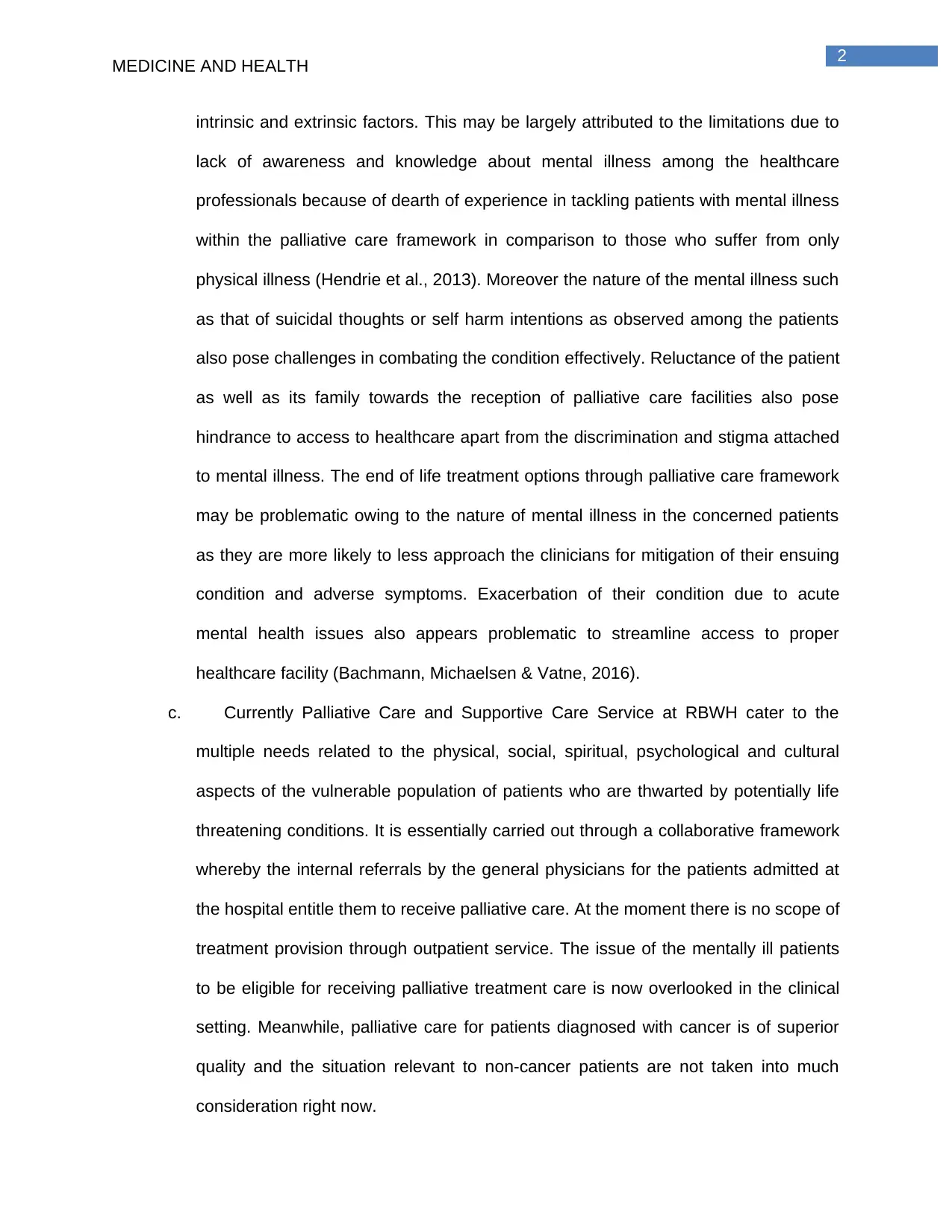
2
MEDICINE AND HEALTH
intrinsic and extrinsic factors. This may be largely attributed to the limitations due to
lack of awareness and knowledge about mental illness among the healthcare
professionals because of dearth of experience in tackling patients with mental illness
within the palliative care framework in comparison to those who suffer from only
physical illness (Hendrie et al., 2013). Moreover the nature of the mental illness such
as that of suicidal thoughts or self harm intentions as observed among the patients
also pose challenges in combating the condition effectively. Reluctance of the patient
as well as its family towards the reception of palliative care facilities also pose
hindrance to access to healthcare apart from the discrimination and stigma attached
to mental illness. The end of life treatment options through palliative care framework
may be problematic owing to the nature of mental illness in the concerned patients
as they are more likely to less approach the clinicians for mitigation of their ensuing
condition and adverse symptoms. Exacerbation of their condition due to acute
mental health issues also appears problematic to streamline access to proper
healthcare facility (Bachmann, Michaelsen & Vatne, 2016).
c. Currently Palliative Care and Supportive Care Service at RBWH cater to the
multiple needs related to the physical, social, spiritual, psychological and cultural
aspects of the vulnerable population of patients who are thwarted by potentially life
threatening conditions. It is essentially carried out through a collaborative framework
whereby the internal referrals by the general physicians for the patients admitted at
the hospital entitle them to receive palliative care. At the moment there is no scope of
treatment provision through outpatient service. The issue of the mentally ill patients
to be eligible for receiving palliative treatment care is now overlooked in the clinical
setting. Meanwhile, palliative care for patients diagnosed with cancer is of superior
quality and the situation relevant to non-cancer patients are not taken into much
consideration right now.
MEDICINE AND HEALTH
intrinsic and extrinsic factors. This may be largely attributed to the limitations due to
lack of awareness and knowledge about mental illness among the healthcare
professionals because of dearth of experience in tackling patients with mental illness
within the palliative care framework in comparison to those who suffer from only
physical illness (Hendrie et al., 2013). Moreover the nature of the mental illness such
as that of suicidal thoughts or self harm intentions as observed among the patients
also pose challenges in combating the condition effectively. Reluctance of the patient
as well as its family towards the reception of palliative care facilities also pose
hindrance to access to healthcare apart from the discrimination and stigma attached
to mental illness. The end of life treatment options through palliative care framework
may be problematic owing to the nature of mental illness in the concerned patients
as they are more likely to less approach the clinicians for mitigation of their ensuing
condition and adverse symptoms. Exacerbation of their condition due to acute
mental health issues also appears problematic to streamline access to proper
healthcare facility (Bachmann, Michaelsen & Vatne, 2016).
c. Currently Palliative Care and Supportive Care Service at RBWH cater to the
multiple needs related to the physical, social, spiritual, psychological and cultural
aspects of the vulnerable population of patients who are thwarted by potentially life
threatening conditions. It is essentially carried out through a collaborative framework
whereby the internal referrals by the general physicians for the patients admitted at
the hospital entitle them to receive palliative care. At the moment there is no scope of
treatment provision through outpatient service. The issue of the mentally ill patients
to be eligible for receiving palliative treatment care is now overlooked in the clinical
setting. Meanwhile, palliative care for patients diagnosed with cancer is of superior
quality and the situation relevant to non-cancer patients are not taken into much
consideration right now.
⊘ This is a preview!⊘
Do you want full access?
Subscribe today to unlock all pages.

Trusted by 1+ million students worldwide
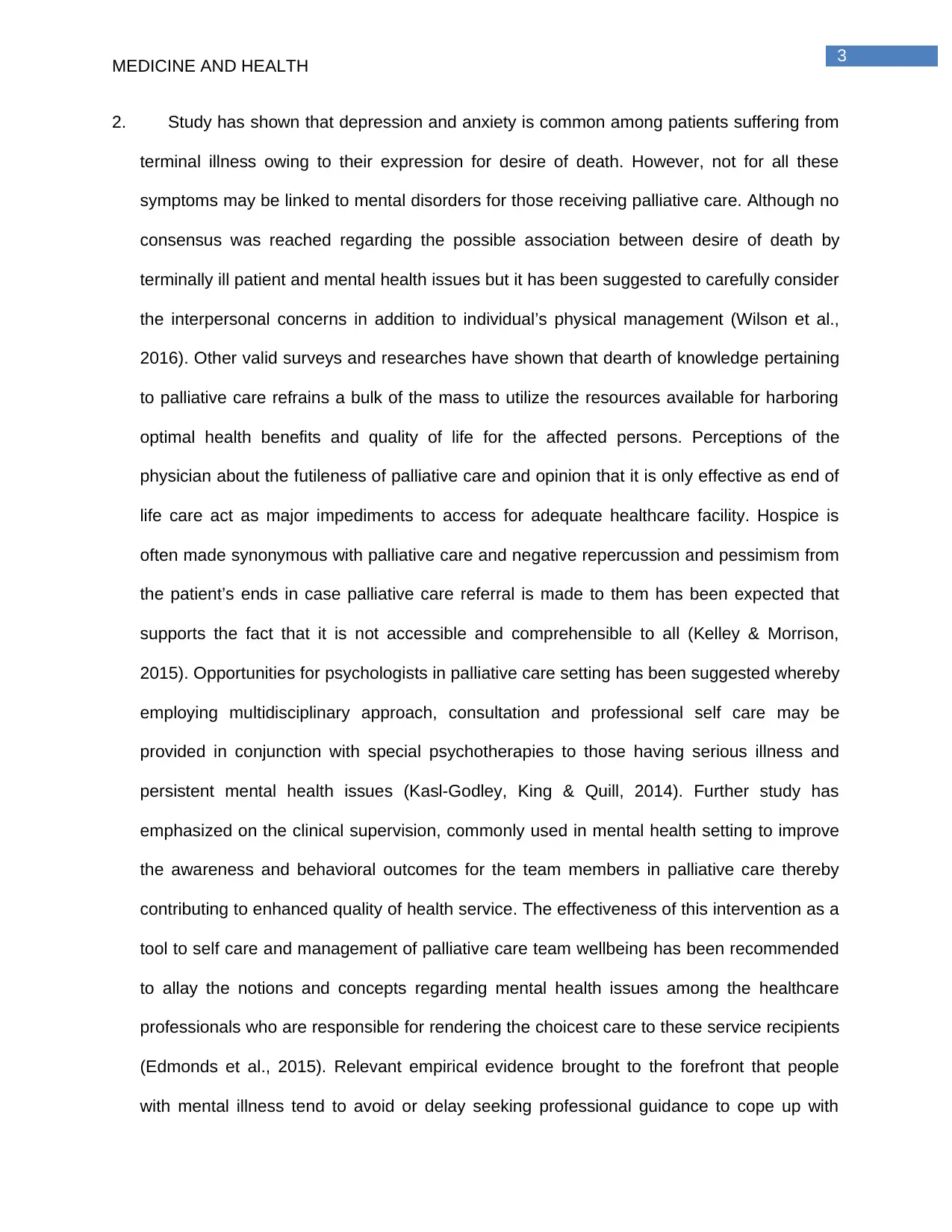
3
MEDICINE AND HEALTH
2. Study has shown that depression and anxiety is common among patients suffering from
terminal illness owing to their expression for desire of death. However, not for all these
symptoms may be linked to mental disorders for those receiving palliative care. Although no
consensus was reached regarding the possible association between desire of death by
terminally ill patient and mental health issues but it has been suggested to carefully consider
the interpersonal concerns in addition to individual’s physical management (Wilson et al.,
2016). Other valid surveys and researches have shown that dearth of knowledge pertaining
to palliative care refrains a bulk of the mass to utilize the resources available for harboring
optimal health benefits and quality of life for the affected persons. Perceptions of the
physician about the futileness of palliative care and opinion that it is only effective as end of
life care act as major impediments to access for adequate healthcare facility. Hospice is
often made synonymous with palliative care and negative repercussion and pessimism from
the patient’s ends in case palliative care referral is made to them has been expected that
supports the fact that it is not accessible and comprehensible to all (Kelley & Morrison,
2015). Opportunities for psychologists in palliative care setting has been suggested whereby
employing multidisciplinary approach, consultation and professional self care may be
provided in conjunction with special psychotherapies to those having serious illness and
persistent mental health issues (Kasl-Godley, King & Quill, 2014). Further study has
emphasized on the clinical supervision, commonly used in mental health setting to improve
the awareness and behavioral outcomes for the team members in palliative care thereby
contributing to enhanced quality of health service. The effectiveness of this intervention as a
tool to self care and management of palliative care team wellbeing has been recommended
to allay the notions and concepts regarding mental health issues among the healthcare
professionals who are responsible for rendering the choicest care to these service recipients
(Edmonds et al., 2015). Relevant empirical evidence brought to the forefront that people
with mental illness tend to avoid or delay seeking professional guidance to cope up with
MEDICINE AND HEALTH
2. Study has shown that depression and anxiety is common among patients suffering from
terminal illness owing to their expression for desire of death. However, not for all these
symptoms may be linked to mental disorders for those receiving palliative care. Although no
consensus was reached regarding the possible association between desire of death by
terminally ill patient and mental health issues but it has been suggested to carefully consider
the interpersonal concerns in addition to individual’s physical management (Wilson et al.,
2016). Other valid surveys and researches have shown that dearth of knowledge pertaining
to palliative care refrains a bulk of the mass to utilize the resources available for harboring
optimal health benefits and quality of life for the affected persons. Perceptions of the
physician about the futileness of palliative care and opinion that it is only effective as end of
life care act as major impediments to access for adequate healthcare facility. Hospice is
often made synonymous with palliative care and negative repercussion and pessimism from
the patient’s ends in case palliative care referral is made to them has been expected that
supports the fact that it is not accessible and comprehensible to all (Kelley & Morrison,
2015). Opportunities for psychologists in palliative care setting has been suggested whereby
employing multidisciplinary approach, consultation and professional self care may be
provided in conjunction with special psychotherapies to those having serious illness and
persistent mental health issues (Kasl-Godley, King & Quill, 2014). Further study has
emphasized on the clinical supervision, commonly used in mental health setting to improve
the awareness and behavioral outcomes for the team members in palliative care thereby
contributing to enhanced quality of health service. The effectiveness of this intervention as a
tool to self care and management of palliative care team wellbeing has been recommended
to allay the notions and concepts regarding mental health issues among the healthcare
professionals who are responsible for rendering the choicest care to these service recipients
(Edmonds et al., 2015). Relevant empirical evidence brought to the forefront that people
with mental illness tend to avoid or delay seeking professional guidance to cope up with
Paraphrase This Document
Need a fresh take? Get an instant paraphrase of this document with our AI Paraphraser
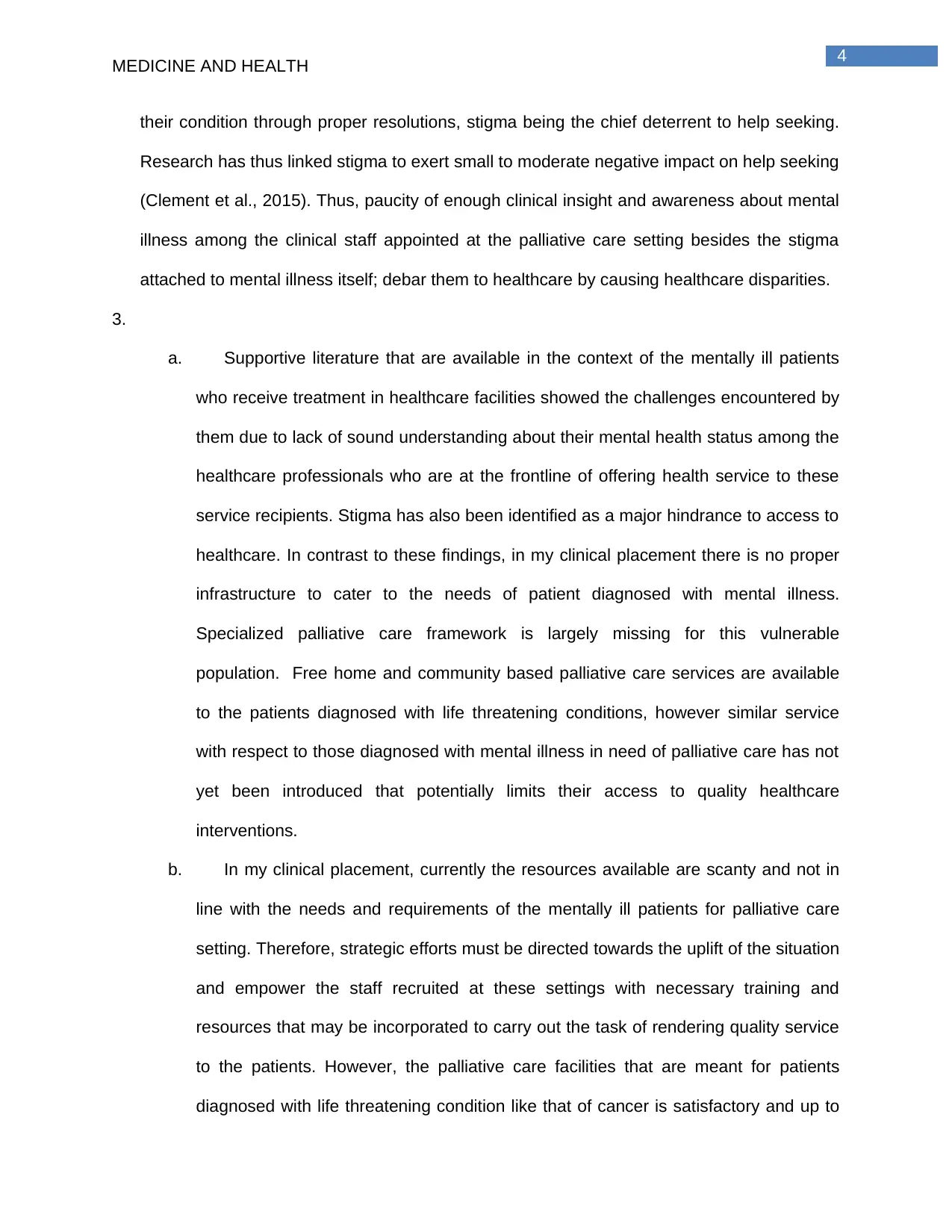
4
MEDICINE AND HEALTH
their condition through proper resolutions, stigma being the chief deterrent to help seeking.
Research has thus linked stigma to exert small to moderate negative impact on help seeking
(Clement et al., 2015). Thus, paucity of enough clinical insight and awareness about mental
illness among the clinical staff appointed at the palliative care setting besides the stigma
attached to mental illness itself; debar them to healthcare by causing healthcare disparities.
3.
a. Supportive literature that are available in the context of the mentally ill patients
who receive treatment in healthcare facilities showed the challenges encountered by
them due to lack of sound understanding about their mental health status among the
healthcare professionals who are at the frontline of offering health service to these
service recipients. Stigma has also been identified as a major hindrance to access to
healthcare. In contrast to these findings, in my clinical placement there is no proper
infrastructure to cater to the needs of patient diagnosed with mental illness.
Specialized palliative care framework is largely missing for this vulnerable
population. Free home and community based palliative care services are available
to the patients diagnosed with life threatening conditions, however similar service
with respect to those diagnosed with mental illness in need of palliative care has not
yet been introduced that potentially limits their access to quality healthcare
interventions.
b. In my clinical placement, currently the resources available are scanty and not in
line with the needs and requirements of the mentally ill patients for palliative care
setting. Therefore, strategic efforts must be directed towards the uplift of the situation
and empower the staff recruited at these settings with necessary training and
resources that may be incorporated to carry out the task of rendering quality service
to the patients. However, the palliative care facilities that are meant for patients
diagnosed with life threatening condition like that of cancer is satisfactory and up to
MEDICINE AND HEALTH
their condition through proper resolutions, stigma being the chief deterrent to help seeking.
Research has thus linked stigma to exert small to moderate negative impact on help seeking
(Clement et al., 2015). Thus, paucity of enough clinical insight and awareness about mental
illness among the clinical staff appointed at the palliative care setting besides the stigma
attached to mental illness itself; debar them to healthcare by causing healthcare disparities.
3.
a. Supportive literature that are available in the context of the mentally ill patients
who receive treatment in healthcare facilities showed the challenges encountered by
them due to lack of sound understanding about their mental health status among the
healthcare professionals who are at the frontline of offering health service to these
service recipients. Stigma has also been identified as a major hindrance to access to
healthcare. In contrast to these findings, in my clinical placement there is no proper
infrastructure to cater to the needs of patient diagnosed with mental illness.
Specialized palliative care framework is largely missing for this vulnerable
population. Free home and community based palliative care services are available
to the patients diagnosed with life threatening conditions, however similar service
with respect to those diagnosed with mental illness in need of palliative care has not
yet been introduced that potentially limits their access to quality healthcare
interventions.
b. In my clinical placement, currently the resources available are scanty and not in
line with the needs and requirements of the mentally ill patients for palliative care
setting. Therefore, strategic efforts must be directed towards the uplift of the situation
and empower the staff recruited at these settings with necessary training and
resources that may be incorporated to carry out the task of rendering quality service
to the patients. However, the palliative care facilities that are meant for patients
diagnosed with life threatening condition like that of cancer is satisfactory and up to
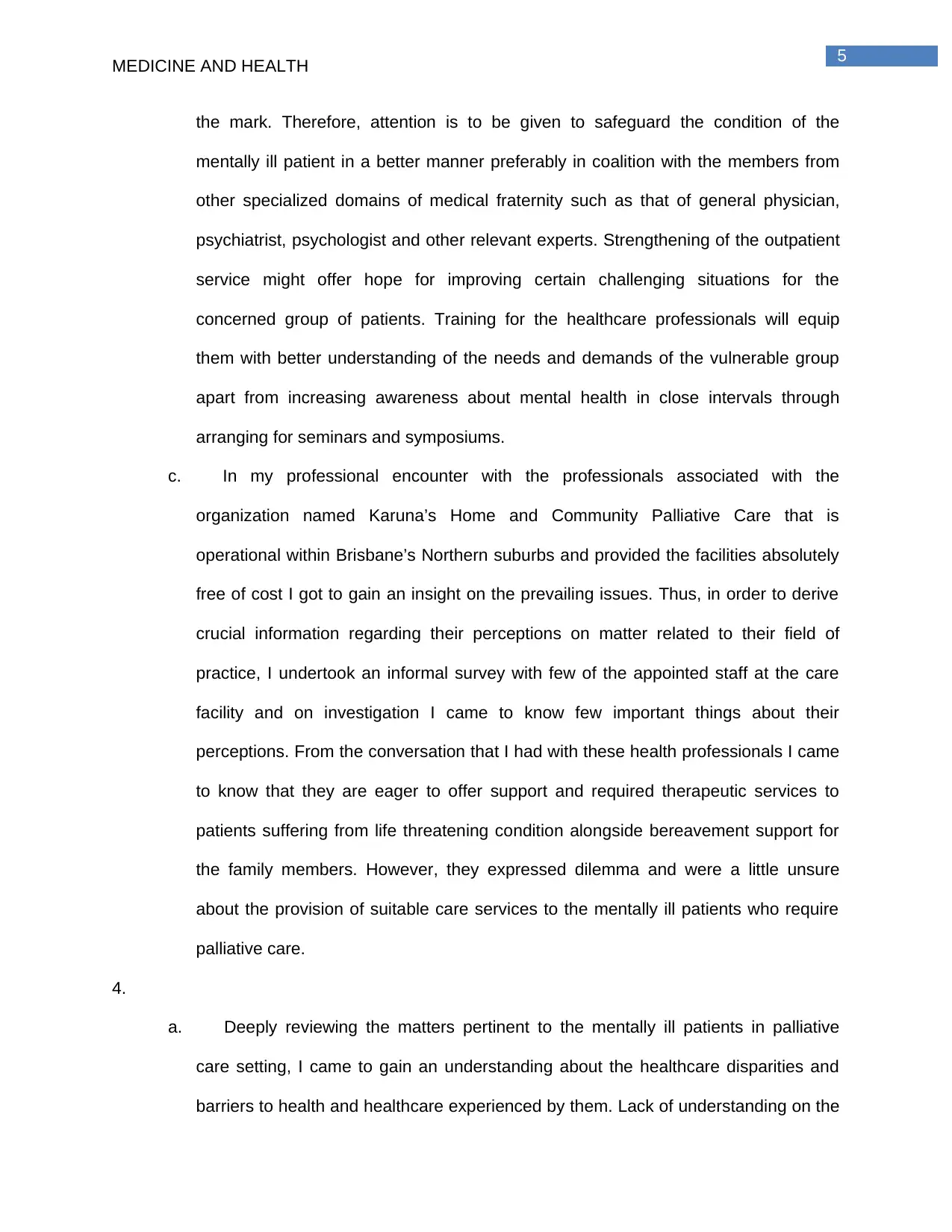
5
MEDICINE AND HEALTH
the mark. Therefore, attention is to be given to safeguard the condition of the
mentally ill patient in a better manner preferably in coalition with the members from
other specialized domains of medical fraternity such as that of general physician,
psychiatrist, psychologist and other relevant experts. Strengthening of the outpatient
service might offer hope for improving certain challenging situations for the
concerned group of patients. Training for the healthcare professionals will equip
them with better understanding of the needs and demands of the vulnerable group
apart from increasing awareness about mental health in close intervals through
arranging for seminars and symposiums.
c. In my professional encounter with the professionals associated with the
organization named Karuna’s Home and Community Palliative Care that is
operational within Brisbane’s Northern suburbs and provided the facilities absolutely
free of cost I got to gain an insight on the prevailing issues. Thus, in order to derive
crucial information regarding their perceptions on matter related to their field of
practice, I undertook an informal survey with few of the appointed staff at the care
facility and on investigation I came to know few important things about their
perceptions. From the conversation that I had with these health professionals I came
to know that they are eager to offer support and required therapeutic services to
patients suffering from life threatening condition alongside bereavement support for
the family members. However, they expressed dilemma and were a little unsure
about the provision of suitable care services to the mentally ill patients who require
palliative care.
4.
a. Deeply reviewing the matters pertinent to the mentally ill patients in palliative
care setting, I came to gain an understanding about the healthcare disparities and
barriers to health and healthcare experienced by them. Lack of understanding on the
MEDICINE AND HEALTH
the mark. Therefore, attention is to be given to safeguard the condition of the
mentally ill patient in a better manner preferably in coalition with the members from
other specialized domains of medical fraternity such as that of general physician,
psychiatrist, psychologist and other relevant experts. Strengthening of the outpatient
service might offer hope for improving certain challenging situations for the
concerned group of patients. Training for the healthcare professionals will equip
them with better understanding of the needs and demands of the vulnerable group
apart from increasing awareness about mental health in close intervals through
arranging for seminars and symposiums.
c. In my professional encounter with the professionals associated with the
organization named Karuna’s Home and Community Palliative Care that is
operational within Brisbane’s Northern suburbs and provided the facilities absolutely
free of cost I got to gain an insight on the prevailing issues. Thus, in order to derive
crucial information regarding their perceptions on matter related to their field of
practice, I undertook an informal survey with few of the appointed staff at the care
facility and on investigation I came to know few important things about their
perceptions. From the conversation that I had with these health professionals I came
to know that they are eager to offer support and required therapeutic services to
patients suffering from life threatening condition alongside bereavement support for
the family members. However, they expressed dilemma and were a little unsure
about the provision of suitable care services to the mentally ill patients who require
palliative care.
4.
a. Deeply reviewing the matters pertinent to the mentally ill patients in palliative
care setting, I came to gain an understanding about the healthcare disparities and
barriers to health and healthcare experienced by them. Lack of understanding on the
⊘ This is a preview!⊘
Do you want full access?
Subscribe today to unlock all pages.

Trusted by 1+ million students worldwide
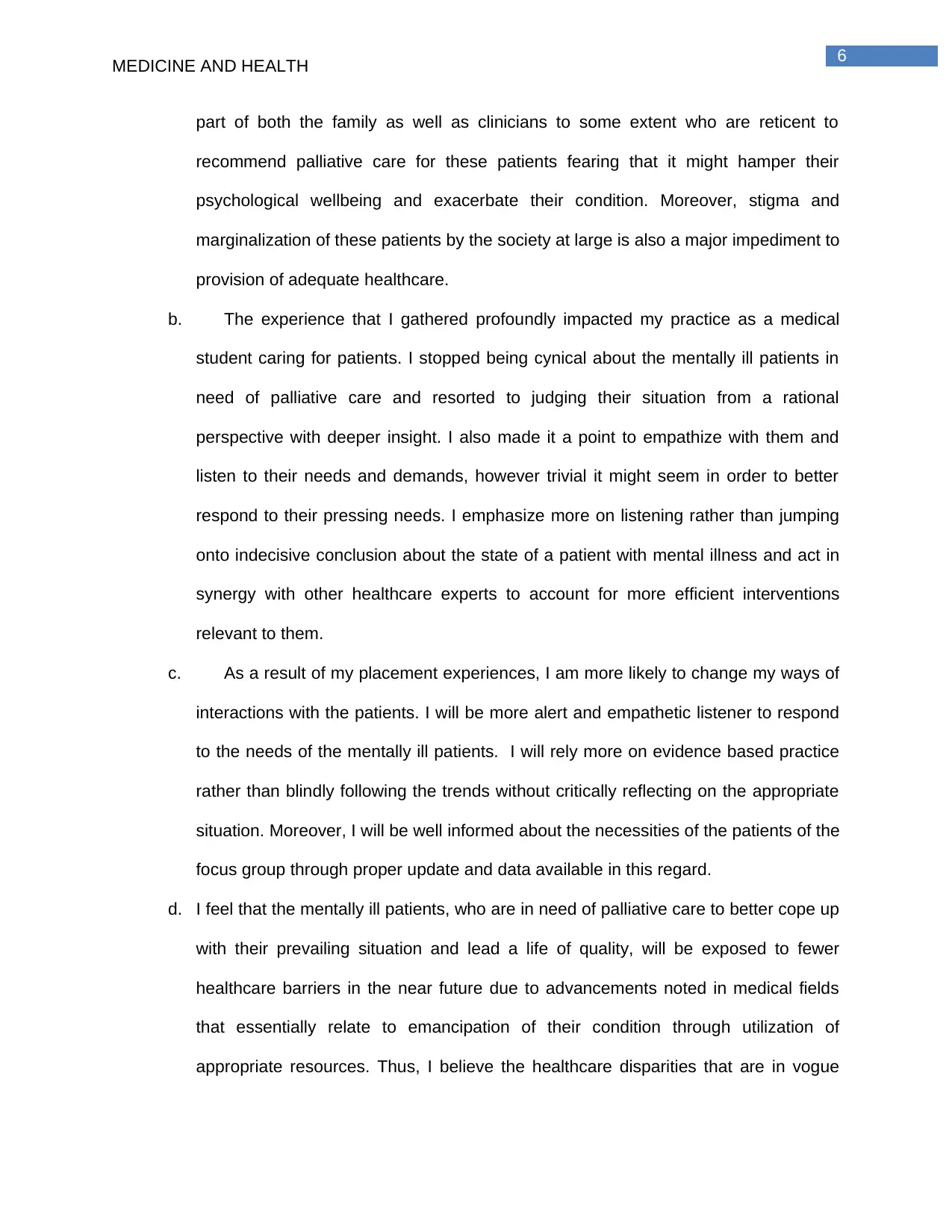
6
MEDICINE AND HEALTH
part of both the family as well as clinicians to some extent who are reticent to
recommend palliative care for these patients fearing that it might hamper their
psychological wellbeing and exacerbate their condition. Moreover, stigma and
marginalization of these patients by the society at large is also a major impediment to
provision of adequate healthcare.
b. The experience that I gathered profoundly impacted my practice as a medical
student caring for patients. I stopped being cynical about the mentally ill patients in
need of palliative care and resorted to judging their situation from a rational
perspective with deeper insight. I also made it a point to empathize with them and
listen to their needs and demands, however trivial it might seem in order to better
respond to their pressing needs. I emphasize more on listening rather than jumping
onto indecisive conclusion about the state of a patient with mental illness and act in
synergy with other healthcare experts to account for more efficient interventions
relevant to them.
c. As a result of my placement experiences, I am more likely to change my ways of
interactions with the patients. I will be more alert and empathetic listener to respond
to the needs of the mentally ill patients. I will rely more on evidence based practice
rather than blindly following the trends without critically reflecting on the appropriate
situation. Moreover, I will be well informed about the necessities of the patients of the
focus group through proper update and data available in this regard.
d. I feel that the mentally ill patients, who are in need of palliative care to better cope up
with their prevailing situation and lead a life of quality, will be exposed to fewer
healthcare barriers in the near future due to advancements noted in medical fields
that essentially relate to emancipation of their condition through utilization of
appropriate resources. Thus, I believe the healthcare disparities that are in vogue
MEDICINE AND HEALTH
part of both the family as well as clinicians to some extent who are reticent to
recommend palliative care for these patients fearing that it might hamper their
psychological wellbeing and exacerbate their condition. Moreover, stigma and
marginalization of these patients by the society at large is also a major impediment to
provision of adequate healthcare.
b. The experience that I gathered profoundly impacted my practice as a medical
student caring for patients. I stopped being cynical about the mentally ill patients in
need of palliative care and resorted to judging their situation from a rational
perspective with deeper insight. I also made it a point to empathize with them and
listen to their needs and demands, however trivial it might seem in order to better
respond to their pressing needs. I emphasize more on listening rather than jumping
onto indecisive conclusion about the state of a patient with mental illness and act in
synergy with other healthcare experts to account for more efficient interventions
relevant to them.
c. As a result of my placement experiences, I am more likely to change my ways of
interactions with the patients. I will be more alert and empathetic listener to respond
to the needs of the mentally ill patients. I will rely more on evidence based practice
rather than blindly following the trends without critically reflecting on the appropriate
situation. Moreover, I will be well informed about the necessities of the patients of the
focus group through proper update and data available in this regard.
d. I feel that the mentally ill patients, who are in need of palliative care to better cope up
with their prevailing situation and lead a life of quality, will be exposed to fewer
healthcare barriers in the near future due to advancements noted in medical fields
that essentially relate to emancipation of their condition through utilization of
appropriate resources. Thus, I believe the healthcare disparities that are in vogue
Paraphrase This Document
Need a fresh take? Get an instant paraphrase of this document with our AI Paraphraser
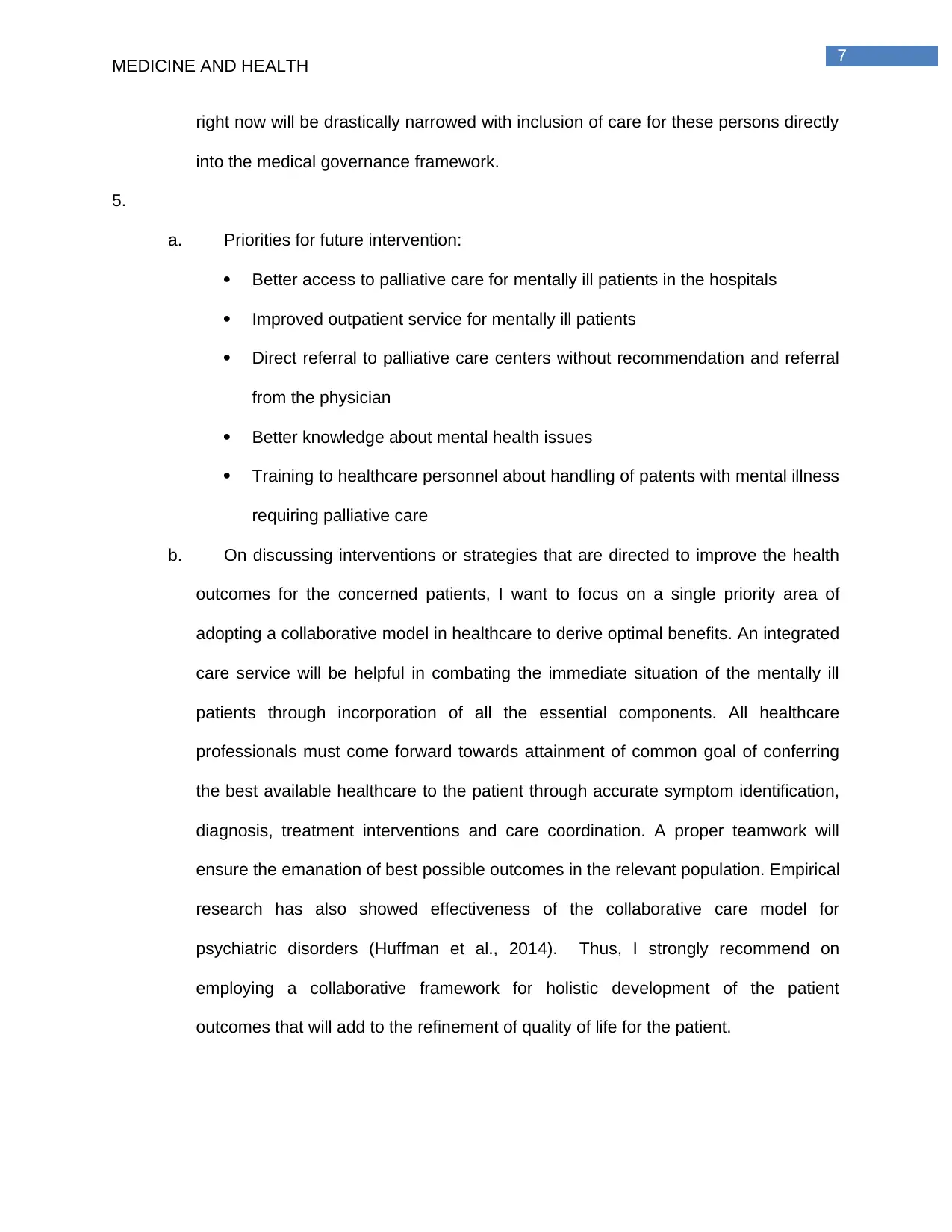
7
MEDICINE AND HEALTH
right now will be drastically narrowed with inclusion of care for these persons directly
into the medical governance framework.
5.
a. Priorities for future intervention:
Better access to palliative care for mentally ill patients in the hospitals
Improved outpatient service for mentally ill patients
Direct referral to palliative care centers without recommendation and referral
from the physician
Better knowledge about mental health issues
Training to healthcare personnel about handling of patents with mental illness
requiring palliative care
b. On discussing interventions or strategies that are directed to improve the health
outcomes for the concerned patients, I want to focus on a single priority area of
adopting a collaborative model in healthcare to derive optimal benefits. An integrated
care service will be helpful in combating the immediate situation of the mentally ill
patients through incorporation of all the essential components. All healthcare
professionals must come forward towards attainment of common goal of conferring
the best available healthcare to the patient through accurate symptom identification,
diagnosis, treatment interventions and care coordination. A proper teamwork will
ensure the emanation of best possible outcomes in the relevant population. Empirical
research has also showed effectiveness of the collaborative care model for
psychiatric disorders (Huffman et al., 2014). Thus, I strongly recommend on
employing a collaborative framework for holistic development of the patient
outcomes that will add to the refinement of quality of life for the patient.
MEDICINE AND HEALTH
right now will be drastically narrowed with inclusion of care for these persons directly
into the medical governance framework.
5.
a. Priorities for future intervention:
Better access to palliative care for mentally ill patients in the hospitals
Improved outpatient service for mentally ill patients
Direct referral to palliative care centers without recommendation and referral
from the physician
Better knowledge about mental health issues
Training to healthcare personnel about handling of patents with mental illness
requiring palliative care
b. On discussing interventions or strategies that are directed to improve the health
outcomes for the concerned patients, I want to focus on a single priority area of
adopting a collaborative model in healthcare to derive optimal benefits. An integrated
care service will be helpful in combating the immediate situation of the mentally ill
patients through incorporation of all the essential components. All healthcare
professionals must come forward towards attainment of common goal of conferring
the best available healthcare to the patient through accurate symptom identification,
diagnosis, treatment interventions and care coordination. A proper teamwork will
ensure the emanation of best possible outcomes in the relevant population. Empirical
research has also showed effectiveness of the collaborative care model for
psychiatric disorders (Huffman et al., 2014). Thus, I strongly recommend on
employing a collaborative framework for holistic development of the patient
outcomes that will add to the refinement of quality of life for the patient.
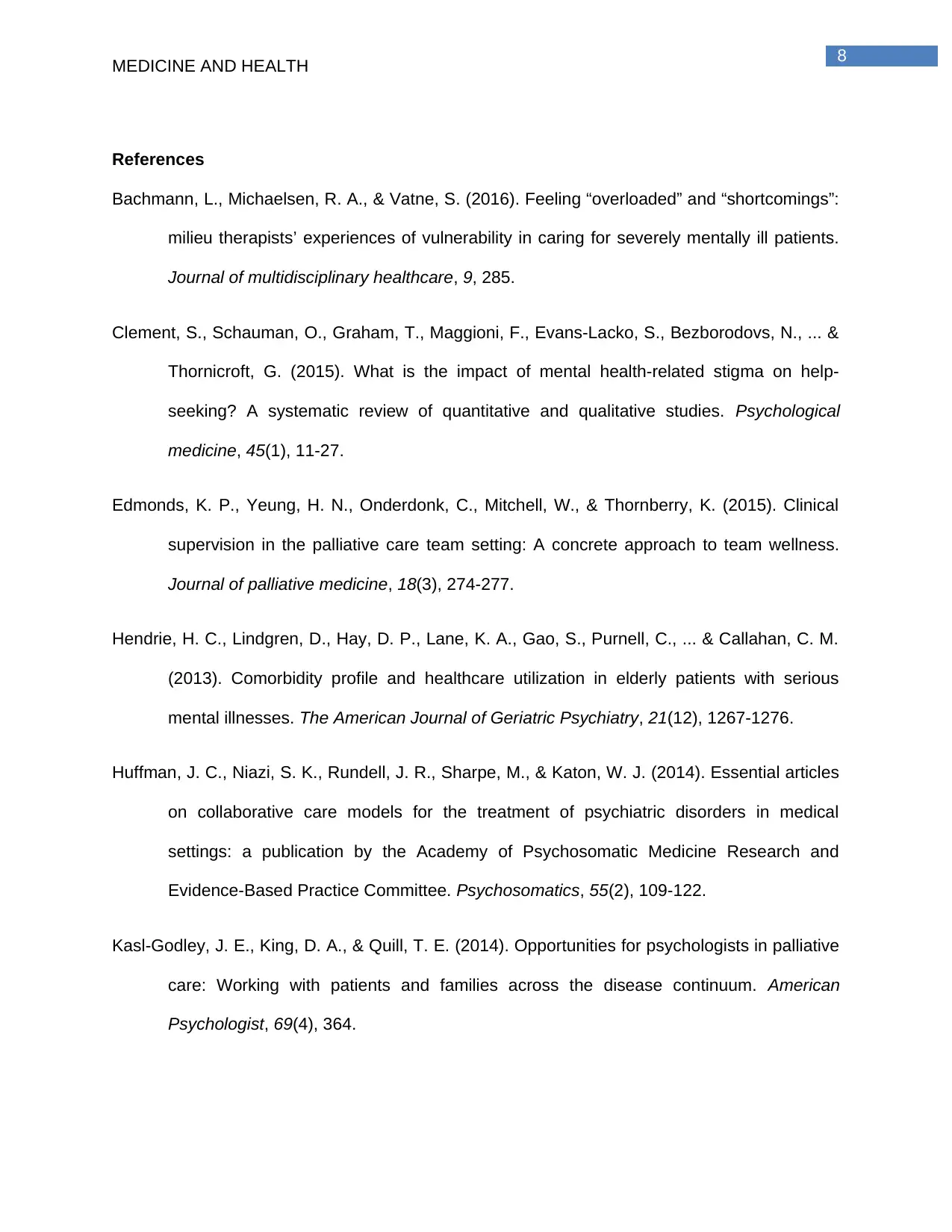
8
MEDICINE AND HEALTH
References
Bachmann, L., Michaelsen, R. A., & Vatne, S. (2016). Feeling “overloaded” and “shortcomings”:
milieu therapists’ experiences of vulnerability in caring for severely mentally ill patients.
Journal of multidisciplinary healthcare, 9, 285.
Clement, S., Schauman, O., Graham, T., Maggioni, F., Evans-Lacko, S., Bezborodovs, N., ... &
Thornicroft, G. (2015). What is the impact of mental health-related stigma on help-
seeking? A systematic review of quantitative and qualitative studies. Psychological
medicine, 45(1), 11-27.
Edmonds, K. P., Yeung, H. N., Onderdonk, C., Mitchell, W., & Thornberry, K. (2015). Clinical
supervision in the palliative care team setting: A concrete approach to team wellness.
Journal of palliative medicine, 18(3), 274-277.
Hendrie, H. C., Lindgren, D., Hay, D. P., Lane, K. A., Gao, S., Purnell, C., ... & Callahan, C. M.
(2013). Comorbidity profile and healthcare utilization in elderly patients with serious
mental illnesses. The American Journal of Geriatric Psychiatry, 21(12), 1267-1276.
Huffman, J. C., Niazi, S. K., Rundell, J. R., Sharpe, M., & Katon, W. J. (2014). Essential articles
on collaborative care models for the treatment of psychiatric disorders in medical
settings: a publication by the Academy of Psychosomatic Medicine Research and
Evidence-Based Practice Committee. Psychosomatics, 55(2), 109-122.
Kasl-Godley, J. E., King, D. A., & Quill, T. E. (2014). Opportunities for psychologists in palliative
care: Working with patients and families across the disease continuum. American
Psychologist, 69(4), 364.
MEDICINE AND HEALTH
References
Bachmann, L., Michaelsen, R. A., & Vatne, S. (2016). Feeling “overloaded” and “shortcomings”:
milieu therapists’ experiences of vulnerability in caring for severely mentally ill patients.
Journal of multidisciplinary healthcare, 9, 285.
Clement, S., Schauman, O., Graham, T., Maggioni, F., Evans-Lacko, S., Bezborodovs, N., ... &
Thornicroft, G. (2015). What is the impact of mental health-related stigma on help-
seeking? A systematic review of quantitative and qualitative studies. Psychological
medicine, 45(1), 11-27.
Edmonds, K. P., Yeung, H. N., Onderdonk, C., Mitchell, W., & Thornberry, K. (2015). Clinical
supervision in the palliative care team setting: A concrete approach to team wellness.
Journal of palliative medicine, 18(3), 274-277.
Hendrie, H. C., Lindgren, D., Hay, D. P., Lane, K. A., Gao, S., Purnell, C., ... & Callahan, C. M.
(2013). Comorbidity profile and healthcare utilization in elderly patients with serious
mental illnesses. The American Journal of Geriatric Psychiatry, 21(12), 1267-1276.
Huffman, J. C., Niazi, S. K., Rundell, J. R., Sharpe, M., & Katon, W. J. (2014). Essential articles
on collaborative care models for the treatment of psychiatric disorders in medical
settings: a publication by the Academy of Psychosomatic Medicine Research and
Evidence-Based Practice Committee. Psychosomatics, 55(2), 109-122.
Kasl-Godley, J. E., King, D. A., & Quill, T. E. (2014). Opportunities for psychologists in palliative
care: Working with patients and families across the disease continuum. American
Psychologist, 69(4), 364.
⊘ This is a preview!⊘
Do you want full access?
Subscribe today to unlock all pages.

Trusted by 1+ million students worldwide
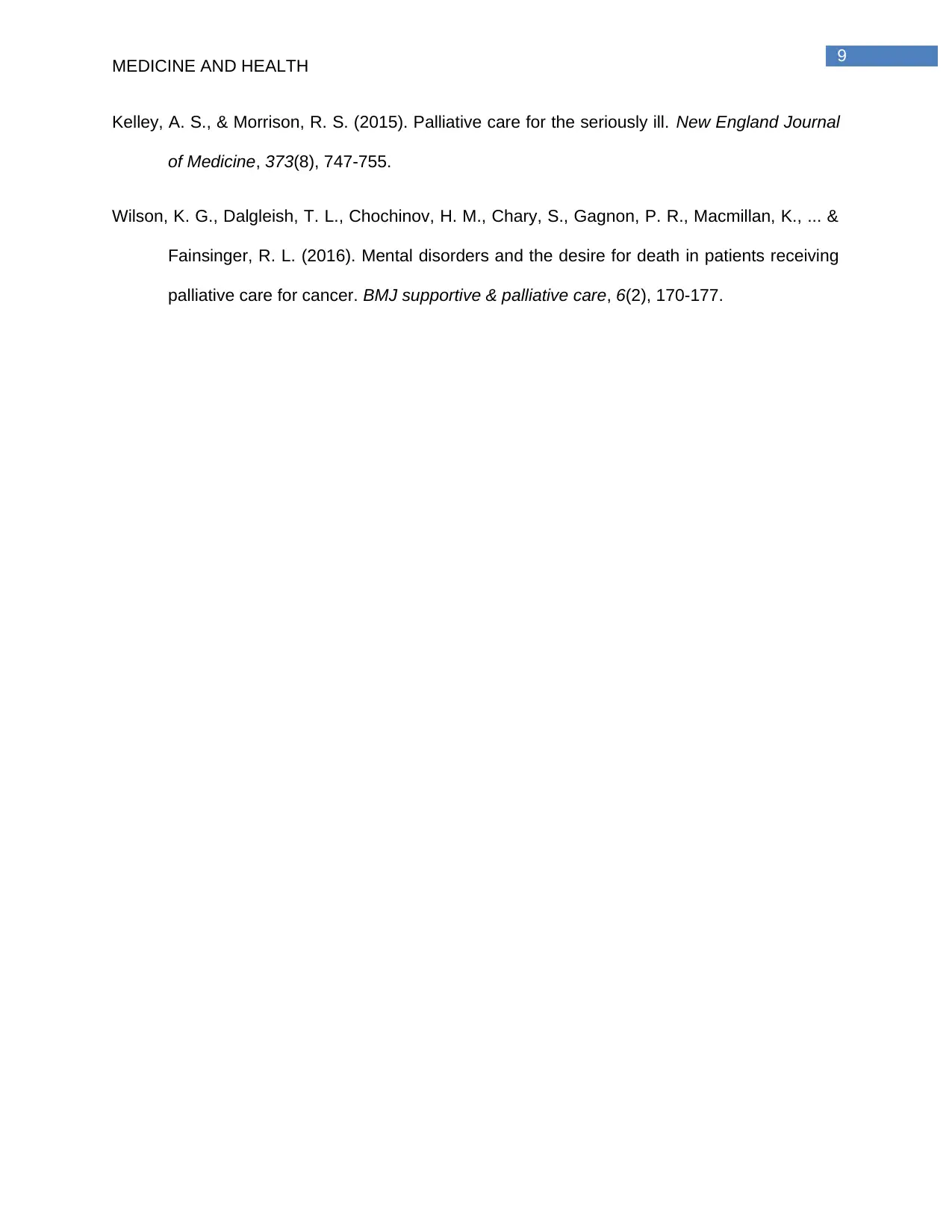
9
MEDICINE AND HEALTH
Kelley, A. S., & Morrison, R. S. (2015). Palliative care for the seriously ill. New England Journal
of Medicine, 373(8), 747-755.
Wilson, K. G., Dalgleish, T. L., Chochinov, H. M., Chary, S., Gagnon, P. R., Macmillan, K., ... &
Fainsinger, R. L. (2016). Mental disorders and the desire for death in patients receiving
palliative care for cancer. BMJ supportive & palliative care, 6(2), 170-177.
MEDICINE AND HEALTH
Kelley, A. S., & Morrison, R. S. (2015). Palliative care for the seriously ill. New England Journal
of Medicine, 373(8), 747-755.
Wilson, K. G., Dalgleish, T. L., Chochinov, H. M., Chary, S., Gagnon, P. R., Macmillan, K., ... &
Fainsinger, R. L. (2016). Mental disorders and the desire for death in patients receiving
palliative care for cancer. BMJ supportive & palliative care, 6(2), 170-177.
1 out of 10
Related Documents
Your All-in-One AI-Powered Toolkit for Academic Success.
+13062052269
info@desklib.com
Available 24*7 on WhatsApp / Email
![[object Object]](/_next/static/media/star-bottom.7253800d.svg)
Unlock your academic potential
Copyright © 2020–2026 A2Z Services. All Rights Reserved. Developed and managed by ZUCOL.




